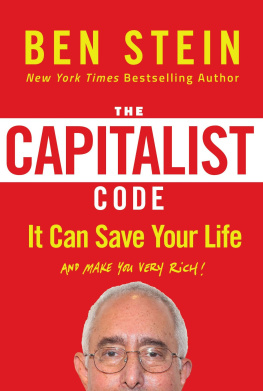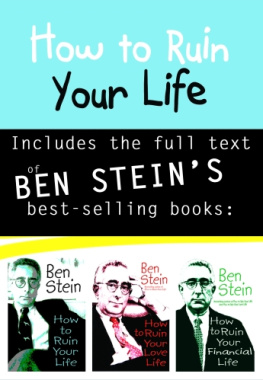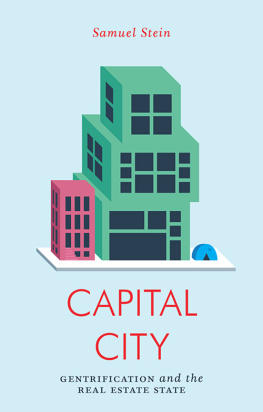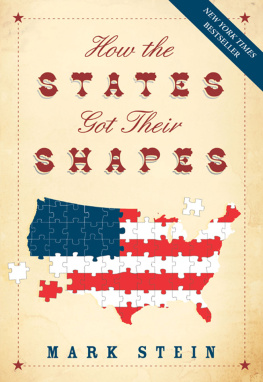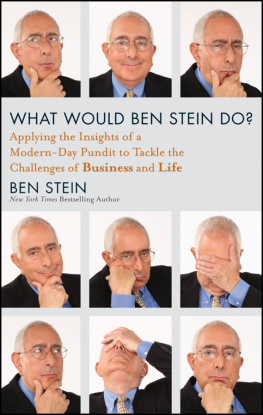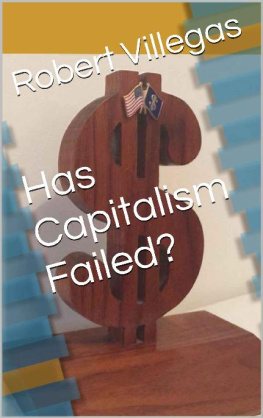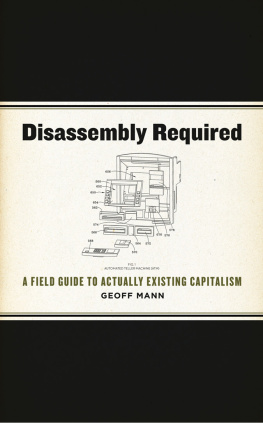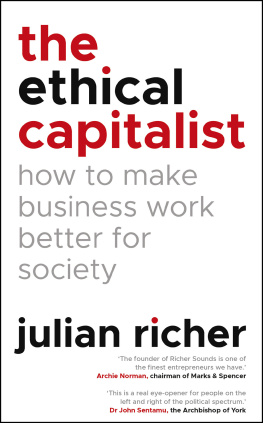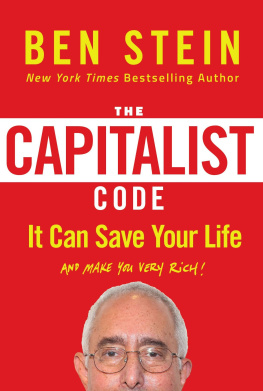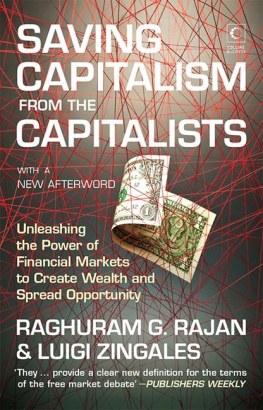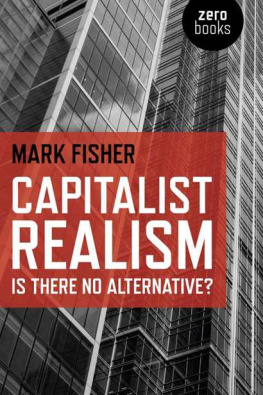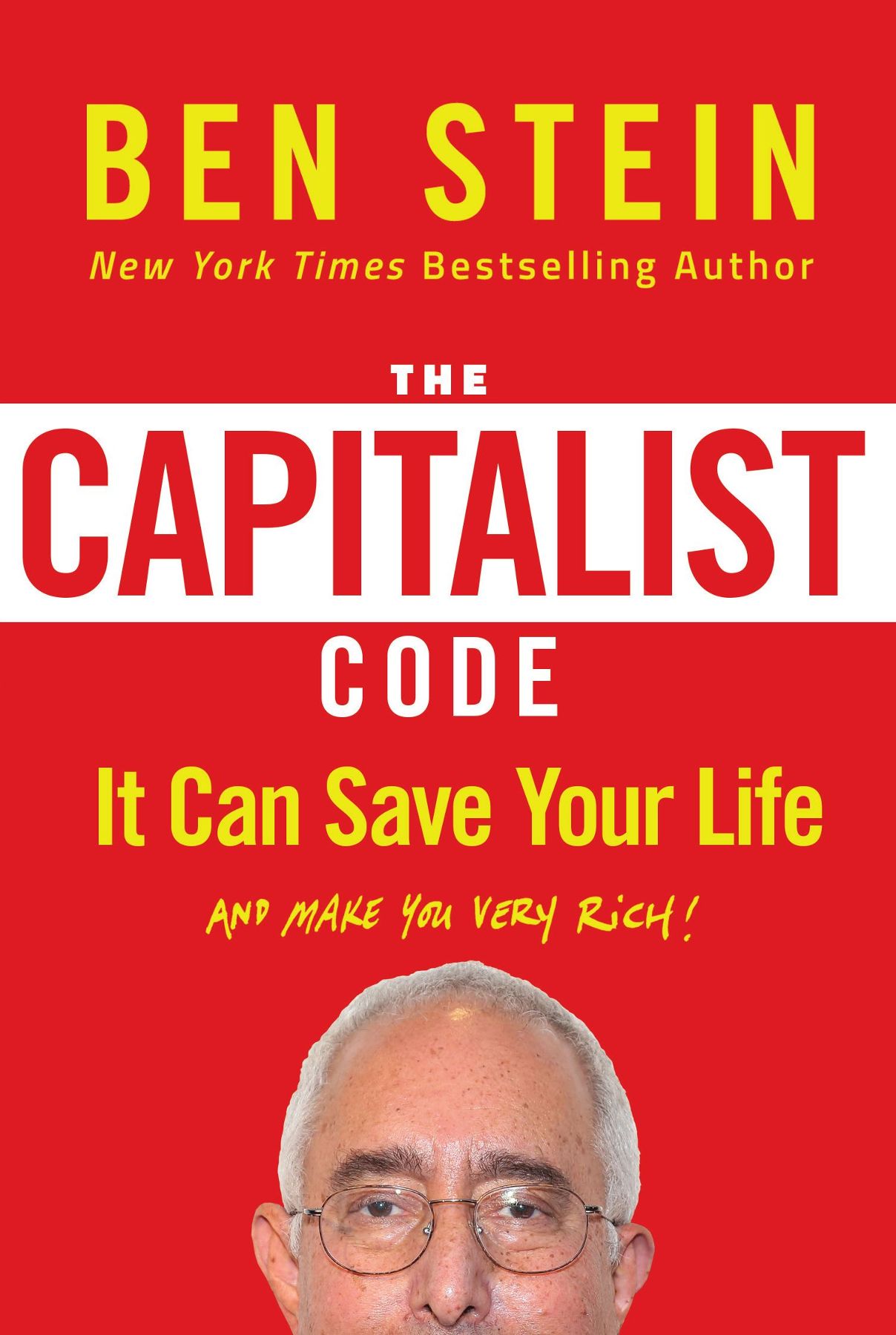
T HE C APITALIST C ODE
It Can Save Your Life
(and Make You Very Rich!)
BEN STEIN
Humanix Books
The Capitalist Code
Copyright 2017 by Ben Stein
All rights reserved
Humanix Books, P.O. Box 20989, West Palm Beach, FL 33416, USA
Library of Congress Control Number: 2017941400
No part of this book may be reproduced or transmitted in any form or by any means, electronic or mechanical, including photocopying, recording, or by any other information storage and retrieval system, without written permission from the publisher.
Cover Photo: Getty Images Inc. Stock # 183078716
Cover Design: Paul McCarthy
Interior Design: Scribe Inc.
Humanix Books is a division of Humanix Publishing, LLC. Its trademark, consisting of the words Humanix is registered in the Patent and Trademark Office and in other countries.
Disclaimer: The information presented in this book is meant to be used for general resource purposes only; it is not intended as specific financial advice for any individual and should not substitute financial advice from a finance professional.
ISBN: 978-1-63006-084-8 (Hardcover)
ISBN: 978-1-63006-085-5 (E-book)
CONTENTS
For my Wife for Life, Alex
For the ultimate guide, friend and mentor, Warren E. Buffett, for my frequent colleague and advisor, Phil DeMuth, and for my pals at Merrill Lynch, Kevin Hanley and Jerry Au.
Tis strange but true; for the truth is always strange; Stranger than fiction.
Lord Byron
Its time for some important truths in your lives. Its never too early for the truth. But first, who am I to presume to tell you the truth?
Young Americans, you know me. In some ways, I am the most well-known teacher of economics in the world. Its not because I know the most about economics. In point of fact, hardly anyone knows anything about economics. There are a jillion people on TV who will tell you they know about economics. Mr. Trump told us he knew about economics; Mrs. Clinton told us she knew about economics. But they didntand almost no one canpredict the future of the United States economy with even a tiny bit of exactitude, if that is what is commonly understood to be the main ability of economists. No one ever could; the economy is fantastically complex. Trying to understand it is like trying to predict the weather or read the minds of the eight billion souls on this earth.
WHAT ECONOMISTS KNOW
I am a superfamous teacher of economics not because of any books or formulas I have written, although I have written many books about economics and finance, including some complex ones mostly authored by my genius friend Phil DeMuth. No, I am famous because Hollywood grabbed me up by the scruff of my neck, threw me around, shone lights on me, and rolled film on me. I played the boring economics teacher in one of the most magnificent movie comedies ever made, Ferris Buellers Day Off. Im the one who asks, Bueller, Bueller? when taking attendance and who tells bored students about the Smoot-Hawley Tariff Act while they fall asleep at their desks and drool onto the Formica desktops.
In fact, Im not an actor by education either, although I have been in hundreds of TV shows and movies. I am trained as an economist (and a lawyer). As I told you, this does not mean that I know with any precision the direction of the U.S. economy, why unemployment is high or low, or especially the direction of stock or commodity pricesneither does anyone else. No Democrat or Republican, man or woman, old or young, can tell the future. Its a rare one who can even speak with the slightest truthfulness about the present. Economists are like psychiatrists; they have theories and ideas and data. But they can prove little.
Economics is about the allocation of scarce goods, chiefly the scarce good known as money. I want to assure you that economists know, in general, which moves make money and which dont. They know, for example, that working is usually (but not always) a better path to prosperity than idleness. They know that trade protectionism sounds good but provides few benefits or none at all.
But that knowledge rarely makes them rich. A rich economist, at least one who has gotten rich from economics, is a rare bird indeed.
Neither myself nor economists as a group are experts in finding hidden gems among stocks. Alas, none of us can pick out the stocks that will be the next Apple or Facebookno one can. At least, no one can for certain. The woods are filled with men and women who will take your money pretending they can pick stocks consistently. With only a few exceptions, theyre not leveling with you.
THE TRUTH ABOUT CAPITALISM IN THE UNITED STATES
But I can tell you some things of value. You are being sold a false bill of goods about money, about the world you live in, and about how to give yourself a bright future, money-wise. Lets start with the obvious: When your professors and your schoolmates tell you that capitalism as we see it in the United States of America right now is an evil, exploitive system, theyre lying. When they tell you that youre being consistently ripped off by Wall Street, theyre lying and theyre hurting you.
In fact, the system of democratic capitalism as now practiced in the U.S.A. is the best, brightest, most hopeful plan for organizing human economic activity that there has ever been. This is true both for you as an individual and for your whole generation. Capitalism is a great supermachine that can put in smart people and groups as ordinary students and workers and take them out as well-to-do happy campers.
Capitalism, if you play the game by the most sensible rules, is like having a neighborhood or dorm basketball game on the local courtswhere the stakes are lunch moneyand being allowed to have LeBron James on your team.
Free market, regulated capitalism is like handing everyone entering the labor force a guidebook to becoming richif the young entrant will only take the time to read the manual. Alas, few will take that timeand theyll suffer for it.
Capitalism is like the ancient feudal system, except now the serfs and peasants can work and save up to own the castle and estates. Or... they can lie on their couches, smoke weed, and pretend they have legitimate obstacles to success in a rigged systemthat is, they can instead do nothing and stay serfs. Life can be faced by moaning and complaining or it can be faced by study, work, optimism, and faith in the free capitalist system. Guess which side gets to live a happier life?
FREE WILL OF THE INDIVIDUAL
What is capitalism? There are many definitions, but the one that applies to us in twenty-first-century America is this: capitalism is a system in which economic decisions are made by individuals voluntarily on the basis of whether they think the decisions will help or harm them financially.
Its a scheme whereby the key factor in the production and distribution of goods and services is the deployment of moneyor capitalfrom private sources to private users of the funds, with those decisions made by private entities. In capitalism, decisions are not enforced based on the whim of the government but by the free will of the individual as such or as part of a groupoften a much larger group.
In this system of free market democratic capitalism, the means of production, distribution, and communication are usually (but not always) owned through possession of shares of stock in publicly owned corporations. These are entities that gather investment funds and do all the hard work of running the investments but then have limited liability if things go bad. The liability of the owner is limited to how much money he or she put in. There is generally no liability beyond that for borrowings or any other obligations of the corporation. In Europe, these vehicles are often called LLCs (limited liability corporations). This part of free market capitalismlimiting the liability and the downside of the investors and yet having no upside limitsis a magnificent lure for investors. In fact, it was not until the eighteenth century, when the limited liability feature came into being, that corporate investing skyrocketed.
Next page
